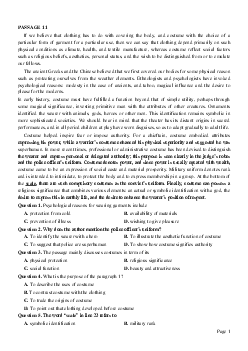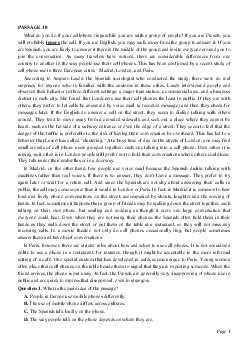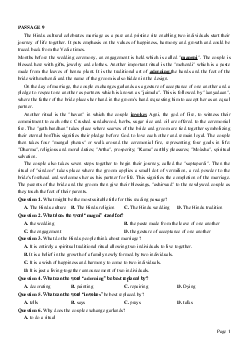


Preview text:
PASSAGE 8
The advent of the Internet may be one of the most important technological developments in recent years.
Never before have so many people had access to so many different sources of information. For all of the
Internet’s advantages, however, people are currently becoming aware of some of its drawbacks and are
looking for creative solutions. Among the current problems, which include a general lack of reliability
and numerous security concerns, the most crucial is speed.
First of all, the Internet has grown very quickly. In 1990, only a few academics had ever heard of the
Internet. In 1996, over 50 million people used it. Every year, the number of people with access to the
Internet doubles. The rapid growth has been a problem. The computer systems which run the Internet
have not been able to keep up with the demand. Also, sometimes, a request for information must pass
through many routing computers before the information can be obtained. A request for information made
in Paris might have to go through computers in New York, Los Angeles and Tokyo in order to obtain the
required information. Consequently, the service is often slow and unpredictable. Service also tends to be
worse when the Internet is busiest - during the business day of the Western Hemisphere - which is also
when companies need its service the most.
Some people are trying to harness the power of networked computers in such a way as to avoid this
problem. In 1995, a group of American universities banded together to form what has come to be known
as Internet II. Internet II is a smaller, more specialized system intended for academic use. Since it is more
specialized, fewer users are allowed access. Consequently, the time required to receive information has decreased.
Businesses are beginning to explore a possible analogue to the Internet II. Many businesses are creating
their own “Intranets”. These are systems that can only be used by the members of the same company. In
theory, fewer users should translate into a faster system. Intranets are very useful for large national and
international companies whose branches need to share information. Another benefit of an Intranet is an
increased amount of security. Since only company employees have access to the information on the
Intranet, their information is protected from competitors. While there is little doubt that the Internet will
eventually be a fast and reliable service, industry and the academic community have taken their own steps
toward making more practical global networks.
Question 1. According to the passage, which of the following is not true of the Internet ?
A. It tends to be unreliable.
B. It has created a sense of financial security.
C. It is too expensive to access.
D. It has become increasingly less popular.
Question 2. According to the passage, which of the following statements was true in 1990?
A. The Internet was a secure means to gain information.
B. The Internet experienced enormous growth rates.
C. Internet data proved to be impractical.
D. Few people were using the Internet.
Question 3. According to the author, what is one reason why the Internet is sometimes slow?
A. Phone lines are often too busy with phone calls and fax transmissions to handle Internet traffic.
B. Most people do not have computers that are fast enough to take advantage of the Internet.
C. Often a request must travel through many computers before it reaches its final destination.
D. Scientists take up too much time on the Internet , thus slowing it down for everyone else. Page 1
Question 4. The word “ obtained” in line 10 is closest in meaning to . A. understood B. acquired C. purchased D. distributed
Question 5. The word “ harness” in line 15 is closest in meaning to . A. utilize B. disguise C. steal D. block
Question 6. According to the passage, what benefits does Internet II have over the Internet I?
A. There is no governmental intervention regulating Internet II.
B. Small businesses pay higher premiums to access to the Internet.
C. Internet II contains more information than the Internet.
D. Internet II has fewer users and therefore is faster to access.
Question 7. The word “ analogue” in line 20 most nearly means . A. similarity B. alternative C. use D. solution
Question 8. The word “their” in line 25 refers to . A. competitors B. company employees C. Intranets D. companies
Question 9. With which of the following conclusions would the author probably agree?
A. Fewer academic communities need to create their own Internet systems.
B. Companies who develop their own Intranets are limiting their information data base.
C. The technology used by Internet creators is too complex for computer owners to understand.
D. An Internet system with fewer users would be quicker.
Question 10. All of the following are advantages of business “ Intranets” mentioned in the passage EXCEPT
A. they provide a higher level of security.
B. they share information with other company branches.
C. they are cheaper than other alternatives.
D. they move data faster. ĐÁP ÁN 1-D 2-D 3-C 4-B 5-A 6-D 7-A 8-B 9-B 10-C
LỜI GIẢI CHI TIẾT Question 1: D
-> D: theo bài đọc, câu nào sau đây không đúng về Internet?A: nó có xu hướng trở nên không đáng tin
cậy; B: nó đã tạo ra ý thức về an toàn tài chính; C: truy cập vào Internet thì quá đắt; D: Internet ngày càng
trở nên ít phổ biếnThông tin trong bài “The advent of the Internet may be one of the most important
technological developments in recent years. Never before have so many people had access to so many
different sources of information. For all of the Internet’s advantages, however, people are currently
becoming aware of some of its drawbacks and are looking for creative solutions. Among the current
problems, which include a general lack of reliability and numerous security concerns, the most crucial is
speed – phát minh về Internet có lẽ là một trong những sự phát triển về công nghệ quan trọng nhất trong
những năm gần đây. Chưa bao giờ mà có nhiều người truy cập vào nhiều nguồn thông tin khác nhau Page 2
như vậy. Tuy nhiên, ngoài rất nhiều lợi ích của Internet, con người gần đây đang nhận thức được những
nhược điểm của Internet và tìm kiếm những giải pháp sáng tạo. Trong số những vấn đề đó là thiếu độ tin
cậy nói chung và rất nhiều các mối quan ngại về độ an toàn, vấn đề quan trọng nhất vẫn là tốc độ” và:
First of all, the Internet has grown very quickly – trước tiên, Internet đã phát triển rất nhanh” -> D sai rồi Question 2: D
-> D: theo bài đọc, câu nào trong số những câu sau là đúng vào năm 1990? A: Internet là cách an toàn để
đạt được thông tin; B: Internet đã trải qua tốc độ phát triển mạnh; C: dữ liệu Internet được chứng tỏ là
không thực tế; D: rất ít người đã sử dụng Internet.Thông tin trong bài “In 1990, only a few academics had
ever heard of the Internet – vào năm 1990, chỉ có vài học viện là biết đến Internet mà thôi” -> câu D đúng Question 3: C
-> C: theo tác giả, đâu là nguyên nhân khiến Internet thường bị chậm?Thông tin trong bài “A request for
information made in Paris might have to go through computers in New York, Los Angeles and Tokyo in
order to obtain the required information. Consequently, the service is often slow and unpredictable – yêu
cầu về thông tin ở Pari phải được truyền qua máy tính ở New York, Los Angeles và Tokyo để đạt được
thông tin theo yêu cầu. Hậu quả là, dịch vụ (cung cấp tin) thường chậm và không thể đoán trước được” ->
đáp án C đúng: thường thì yêu cầu (về thông tin) phải truyền qua nhiều máy tính trước khi nó đến điểm cuối cùng Question 4: B Question 5: A Question 6: D
-> D: theo bài đọc, đâu là lợi ích của Internet II vượt trội so với Internet I?Thông tin trong bài “Internet II
is a smaller, more specialized system intended for academic use. Since it is more specialized, fewer users
are allowed access. Consequently, the time required to receive information has decreased. – Internet II
nhỏ hơn, là một hệ thống chuyên biệt hơn phục vụ mục đích học thuật. Kể từ khi trở nên chuyên biệt hóa
hơn, càng ít người được cho phép truy cập vào Internet II. Kết quả là, thời gian cần để nhận được thông
tin giảm đi” -> đáp án D: Internet II có ít người dùng hơn và do đó truy cập vào đó nhanh hơn. Question 7: A Question 8: B Question 9: B
-> B: kết luận nào trong số các kết luận sau tác giả có thể đồng tình với? A: hầu như không có đơn vị/ cơ
sở học thuật/ chuyên môn nào cần tạo hệ thống Internet riêng (câu này sai vì business/ companies đều là
academic communities hết); B: các công ti phát triển hệ thống Intranet riêng đang giới hạn nguồn dữ liệu
thông tin của họ; C: công nghệ được sử dụng bởi các nhà sáng tạo nên Internet quá phức tạp làm cho
những người sử dụng máy tính không hiểu được (thông tin này không có trong bài); D: một hệ thống
Internet với ít người dùng hơn thì sẽ nhanh hơn (câu này không thể là 1 kết luận đúng được vì nếu đường
truyền thông tin vẫn dài thì dù cho ít người dùng nhưng tốc độ vẫn chậm như thường) Question 10: C Page 3




